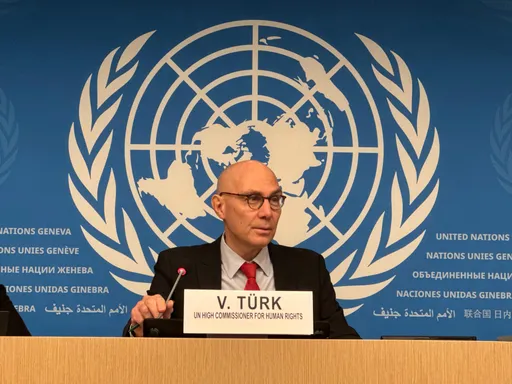Official negotiations on the future of Cyprus are meaningless without the recognition of sovereign equality of both sides, the Turkish Cypriot president has said after the conclusion of informal talks in Geneva.
During the talks that started on Tuesday, the Greek Cypriot administration insisted on a federation model on the island and suggested constitutional changes "unacceptable" for the Turkish Republic of Northern Cyprus (TRNC), Ersin Tatar said in a press conference on Thursday.
Alongside Turkey's Foreign Minister Mevlut Cavusoglu, Tatar underlined that Turkish Cypriots have their own state and will not accept minority status in a Greek Cypriot ruled federation.
He said that before starting formal negotiations on a settlement, equal international status and sovereign equality of the two sides must be recognised.
READ MORE: Turkey backs Turkish Cypriot 'sovereign equality' vision in Geneva talks
Equal status
Tatar sharply criticised Greek Cypriot leader Nicos Anastasiades' proposal to open the Ercan International Airport near the TRNC's capital Lefkosa and the Gazimagusa seaport to international traffic under UN supervision and only after his authorisation.
"This is an insult to Turkish Cypriots," Tatar said, underlining the TRNC's sovereign rights.
On Tuesday, President Tatar presented a six-point proposal to the UN and proposed the establishment of a cooperative relationship between the two sides on the island, with both enjoying equal international status.
For his part, Cavusoglu said the Greek Cypriot leader was not able to bring a new vision to the talks in Geneva but rather repeated existing rhetoric.
Cavusoglu said Turkey would continue to support the two-state solution based on sovereign equality endorsed by TRNC, stressing that they would not compromise on the independence, sovereignty and equality of Turkish Cyprus.
READ MORE: Cyprus sides hold informal talks in Geneva
'No common ground yet'
UN Secretary General Antonio Guterres on Thursday said there is "no common ground yet" to resume formal negotiations on a settlement for the decades-old Cyprus problem.
Guterres was speaking at a news conference in Geneva after three days of informal talks looking to move forward on the Cyprus issue and said he would convene another round of 5 plus 1 talks to move the process forward.
"We have been able to agree that I will convene in the near future another meeting of the 5 (plus) 1, again with the objective to move in the direction of reaching the common ground to allow for formal negotiations to start," noted the UN chief.
"We are determined to do everything we can to make this dialogue move on," said Guterres.
He said he would report to the Security Council in New York on the different positions expressed in this meeting.
"My agenda is strictly to fight for the security and well-being of the Cypriots, of the Greek Cypriots and the Turkish Cypriots, that deserve to live in peace and prosperity together," said Guterres.
READ MORE: Turkey says 'no new negotiations' at Geneva meeting on Cyprus
Decades-long struggle
Cyprus has been mired in a decades-long struggle between the Greek and Turkish Cypriots, despite a series of diplomatic efforts by the UN to achieve a comprehensive settlement.
The island has been divided since 1964 when ethnic attacks forced Turkish Cypriots to withdraw into enclaves for their safety. In 1974, a Greek Cypriot coup aiming at Greece's annexation led to Turkey's military intervention as a guarantor power.
The TRNC was founded in 1983.
The Greek Cypriot administration, backed by Greece, became a member of the EU in 2004, although most Greek Cypriots rejected a UN settlement plan in a referendum that year, which had envisaged a reunited Cyprus joining the EU.
READ MORE: Turkish Cypriot president says Turkey is 'motherland, guarantor country'























